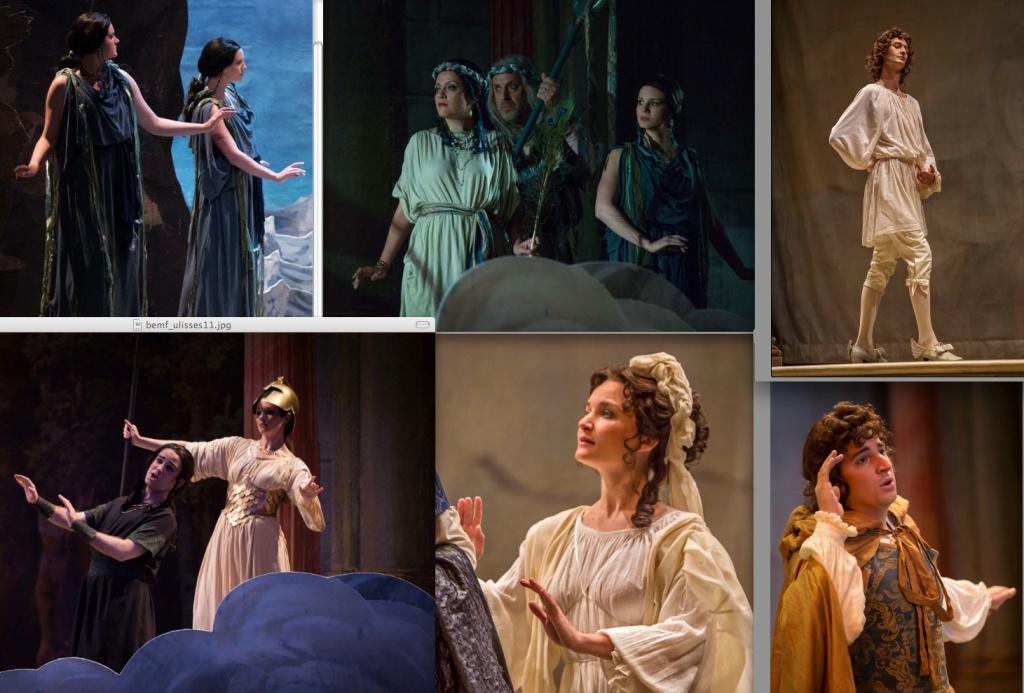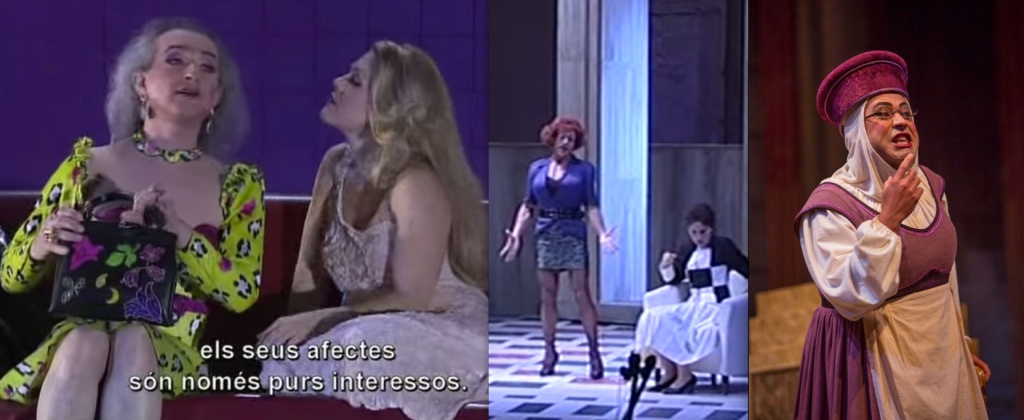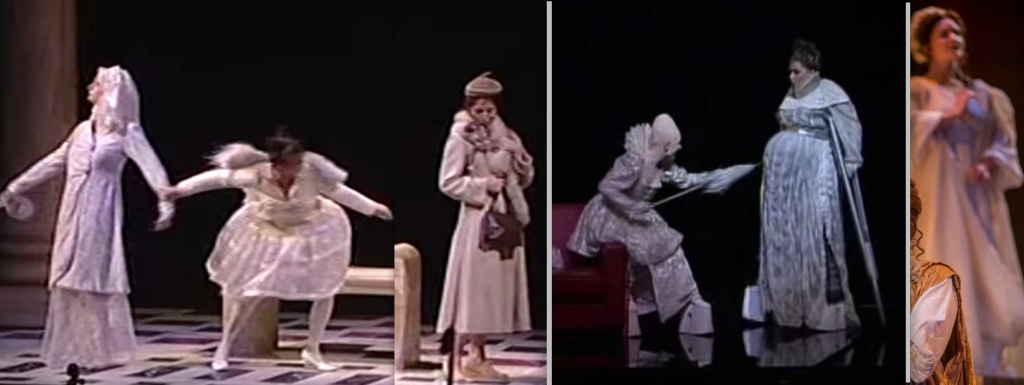Having such a positive experience with Ulisse, I decided at the last minute to book a ticket for the last show of “L’incoronazione di Poppea” despite existing reservations: Unlike Ulisse where the orchestra plays a very big role, Poppea has what i consider low to minimal orchestral participation, depending on the ensemble’s take. In the latter case with minimal orchestra, it’s entirely up to the singers + staging to keep the plot flowing and coherent. It’s not a coincidence that I like Ottone’s music in the first act the best: to me it has the most interaction with the orchestra, similar to the entire Ulisse I’d say (am saying this from a listening point of view, i put the headset on and *listen* for hours on end at work). And unlike with Ulisse where I fell in love with immediately, I’ve tried many times unsuccessfully to plow through Poppea. Here’s an example of two separate orchestras’ takes on the duet of Ottone and Drusilla
Orchestra-heavy (Teatro Liceu 2006):
Orchestra-light (Teatro Liceu 2009):
The BEMF ensemble took the orchestra-light approach, which if listen to clip above you will notice the singers are on their own vocally (and through acting) to carry out quite a bit of “conversational” recitative + singing and to move the story forward. At this point, it’s worth to remind ourselves this is a story of adultery, deceit, murder, hunger for power, and other variety of immorality. It’s here that I find the staging and acting inconsistent, capped by almost a Disney-like love duet in the end that at left 1 member of the audience in front of me extremely happy (he launched a big “WOW” and clapped wildly at the loving couple). I have no problem with love duets at the end of an opera! (e.g., Ulisse!) But here it’s portrayed in such a way we are somehow to forget everything Nerone had done and accept the happily-ever-after ending. I dug a bit on the net and here’s what seemed to follow this love duet in history:
From their knowledge of Roman history, audiences in Venice would have recognised that the apparent triumph of love over virtue, celebrated by Nerone and Poppea in the closing duet, was in reality hollow, and that not long after this event Nerone kicked the pregnant Poppea to death.
To not offer any hint of this is puzzling. To elaborate, it appeared each singer was somewhat on their own regarding his/her character’s behavior / musical phrasing and, in combination with the orchestra-light take, resulted in a disjointed show. Nerone constantly “looks” rather neurotic (perhaps constantly high on drug?) “screeching” his tantrums while his guards appear to have double personality with having deep compassion for Seneca in one moment yet turning ruthless wanting to execute Drusilla immediately in the next. Opposite of neurotic Nerone, almost everyone has this strange way with their hands (and some with their walk), which, already from Ulisse’s staging, made me wonder if that’s how people moved about in the 1600’s . Bellow is a collage of samples from both operas. In fact, the hand thing seems to be a prerequisite for BEMF, and you can tell Amanda Forsythe had it down completely (she’s walking about all the time with these gestures) while bass J.T.Ward still needs to work on his (walking). Some of them even took the bow at curtain call walking this way!

In addition to the zen-like walking with this hand thing, the whole show appeared to be very sterile with a focus on playing “safe”. No inappropriate touching is allowed, petting on the shoulders seems to be acceptable. I’m not asking for wrestling on the ground, stripping, etc. That’s not necessary and in fact might not be offering anything if simply done for the shock value. On the other hand, making everything looking “smooth” and safe is.. well, i fell asleep.. first time since La Forza in Munich last month. But prior to crashing, I got quite upset when it became clear part of the sterilization package is to ensure the gender-strict policy is adhered to. Yes, I was debating skipping this on the ground of systematic casting of countertenors in place of mezzos.. That is until I discovered there IS a mezzo available! But of course she can only be either Poppea’s or Ottavia’s maid. I doubt if it ever occurred to the organizer that she could have also sung Ottone, or God forbid, Nerone! There is however an excess of countertenors so one of the nurses in fact was sung in cross-dressed format.. except he was wrapped up so nicely up to and include the head to make sure no-one in the audience would be offended:
(I had an urge to include a couple snapshots of the same nurse from two different staging)

Individually there are moments of great singing: José Lemos’s first “aria” accompanied by the superb orchestra, Laura Pudwell as gender-appropriate nurse Arnalta with her aria on getting an upgrade in status, Zachary Wilder (i can recognize his voice anytime! very nice phrasing!) as one of Nerone’s guards, Christian Immler as the stern Seneca. Strangely I was not overwhelmingly impressed with Amanda Forsythe’s part though i think it has, entirely, due to the confusion of the portrayal of the character. Perhaps if they have more time to develop so we can understand the mindset of Poppea better her singing would make more sense to me. The one glimpse we get of a soft Poppea who did care for Ottone was during their first encounter when she sang about the roll of the dice, which she acted very nicely and her phrasing made complete sense. I was hoping to see how it developed but it was simply hung there.
Post-opera, cool Stray, her charming sister, and I went for some dinner at my favorite Thai joint to discuss further the production. We pondered whether Amanda Forsythe can play a bitchy Poppea or if her voice is too sweet hence her Poppea came out looking like cinderella. We all agreed she can play any role as both her vocal acting and stage presence are fully equipped. Thus it implied she meant for her character to be this way (having a soft spot for Ottone, wanting the throne, as she discussed in this short interview.) To the various inconsistencies I mentioned above, Stray suspected they had ideas but ran short in rehearsal time, to which I added that is probably why they didn’t have time to process in their thoughts on how to portray such and such characters as non 1-dimensional: When you’re still processing the details your portrayal would come out as confusing.

In summary, for a traditionalist looking for a safe production with happy gender-strict lovebirds, this is the production for you. For me, it was a bit disjointed, alarmingly gender-stuck, and too sterile. It was explained to me that their goal is to reproduce the scenery “as close as possible” to what might have been during the time of Monteverdi (or whichever composers for their operas). This suggests 6, 10, 20 years from now the stagings would remain the same: same clothing, same hand movements, same sterility. Perhaps it is meant for the targeted audience who wants same-ness. In a post-opera conversation with an acquaintance it was suggested to me that for the “type of stagings” I crave for Germany is the place to go, and indeed that’s where I have been every year since discovery of opera in 2009 :-).

Leave a comment